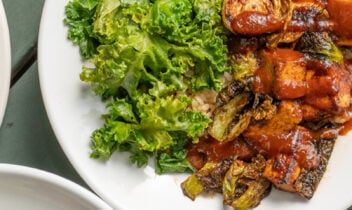Insider’s Viewpoint: Sweet Potato vs Russet Potato

“Are potatoes as bad as they say?” is a question I am often asked on store tours. Or, “Are sweet potatoes really much better than white potatoes?” Let’s take a look.
When we compare the nutrients in different varieties of potatoes, we find some similarities. Potatoes are a starchy vegetable, which means that they are a high carbohydrate food and are quite similar in calorie content (purples are slightly lower). They are all high in fiber and vitamin C, and have almost twice as much potassium as a banana! Potatoes originated in South America; Peru has been known to grow over 5,000 varieties, and still maintains 2,800 varieties today. In the US, the vast majority of potatoes grown are the familiar Russet Burbank potato, which makes our beloved baked potato and french fry.
Carbohydrates & Fiber
Beyond calories, we start seeing some differences. Sweet potatoes and Russets have the exact same number of carbohydrates, reds slightly fewer, and purples contain the fewest grams of carbohydrates.
Fiber? Sweet potatoes are highest and purple potatoes are considerably lower than sweet potatoes or Russets.
Vitamins
Sweet potatoes are loaded with vitamin A, packing almost 700% of the recommended daily value in one medium potato; all the others have none. Sweet potatoes also have about twice the vitamin C of Russet Burbank and red potatoes. They all are great sources of potassium, with red potatoes leading the pack. Purple and red potatoes are unique in the fact that they are packed with antioxidants. The purple potato is full of the antioxidant anthocyanin, like most blue/purple foods.
So, which is best?
With the most fiber, vitamins A & C and a healthy dose of potassium, sweet potatoes come out the winner! Keep in mind all the potatoes are nutrient-dense and each has a unique nutritional strong point, so mix it up next time you grab some.
Comparison of nutrition facts for various types of potatoes (1 medium)
 |
||||||||
 |
Sweet Potato |  |
Russet Potato |  |
Red Potato |  |
Purple Potato | |
 |
||||||||
| Calories Carbohydrates (grams) Fiber (grams) Vitamin A (IU) Vitamin C (mg) Potassium (mg) |
 |
162 37 6 692 57 741 |
 |
161 37 4 0 28 888 |
 |
154 34 3 0 36 962 |
 |
140 30 2 0 60 812 |
 |
||||||||
Laura Holtrop Kohl MS, RD
Dietitian
Harmon’s City Creek
Insider’s Viewpoint Archive


